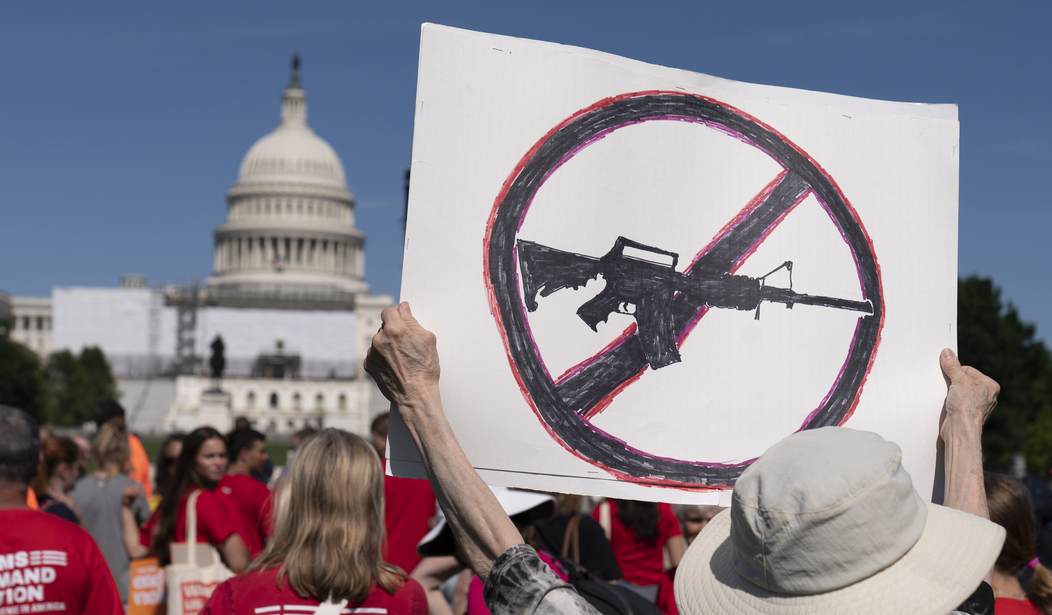The list of things I hate about politics is long and distinguished. But near the top of that list is something I call “feel good legislation.”
Feel good legislation refers to laws that don’t serve any purpose other than to make people feel as if the government is doing something to solve a problem. One example would be hate crime laws like the one Congress passed in 2021 ostensibly to address violence against Asians. It doesn’t take a rocket scientist to figure out that this particular law won’t save a single Asian life.
But it sure feels good, doesn’t it?
The thing about feel good laws is that, while they make the public get all warm and fuzzy inside, they don’t actually do anything productive. It is the legislative equivalent of cheesecake. Sure it tastes great, but it has little nutritional value.
One of the worst forms of cheesecake legislation is related to gun control. Right now, the left is desperately trying to get Americans on board with further restrictions on lawful gun owners by pretending they will be safer if they do so. Unfortunately, the tactic can be quite effective, especially when there is a high-profile mass shooting in the news.
This reality emerged during a recent hearing on gun laws at the Texas Capitol.
“The hearing, which took place after 3 a.m., may be the only debate on gun control in the Texas Capitol this year, following the deaths of 19 children and two teachers in Uvalde last May,” according to Fox News. “Gun control advocates are frustrated with the lack of action on gun violence, as mass shootings continue to occur across the United States. Republican leaders in Texas have not announced any plans to consider or vote on gun control measures before the session ends next month.”
The report notes that Texas Gov. Greg Abbott, along with Republicans in the state legislature, are not too keen on the idea of using the Uvalde school shooting to impose new gun laws.
Nevertheless, other states are looking at more restrictions on firearms. Washington state’s legislature on Wednesday passed a ban on dozens of semi-automatic rifles. The governor will likely sign the bill into law.
In Colorado, a bill that would have also banned the sale or transfer “assault weapons” failed to pass in the state House committee on Thursday. “House Bill 1230 was rejected in a dramatic, 6-7 vote in the House Judiciary Committee at about 1 a.m. following the 14-hour hearing that featured testimony from hundreds of people,” according to the Colorado Sun.
One can understand why the families of the victims of the Uvalde shooting and other similar incidents would be looking for answers. To some, the idea of enacting further restrictions on firearms might seem to be a valid strategy. However, despite what Democrats claim, gun control laws are not a viable way to stop mass shootings or other forms of gun violence.
Gun control laws typically aim to regulate the purchase, possession, and use of firearms, with the intention of reducing access to guns by individuals who may pose a risk to public safety, such as criminals or those with mental health issues. These laws often involve background checks, waiting periods, and restrictions on certain types of firearms. While these measures may seem logical they do not result in tangible reductions in gun violence or increased safety for the general population.
Criminals who are intent on committing acts of gun violence typically do not obtain firearms through legal means. They obtain firearms through illegal channels, such as the black market, theft, or straw purchases (where a person with a clean record purchases a firearm on behalf of someone who cannot legally do so). This means that individuals who are determined to commit gun violence are still able to obtain firearms, regardless of the existence of gun control laws.
Another issue is that gun control laws may not adequately address the underlying factors that contribute to gun violence, such as mental health, poverty, social inequality, and systemic issues. Simply restricting access to firearms without addressing these root causes has not prevented gun violence in the long term. It may merely result in individuals finding alternative means to commit violence, such as using other weapons or engaging in other criminal activities.
Moreover, there is evidence to suggest that gun control laws may disproportionately impact certain communities, such as minority groups or those in low-income neighborhoods. People living in these areas already face higher levels of crime and violence, and restricting their access to firearms may further hinder their ability to defend themselves.
The anti-gunner lobby has used the promise of safety to push its agenda. By making people feel that gun control will make them safer, they are able to make these measures more attractive to the public. Unfortunately, this idea has been shown to be false time and time again.
The opinions expressed by contributors are their own and do not necessarily represent the views of RedState.com.














Join the conversation as a VIP Member